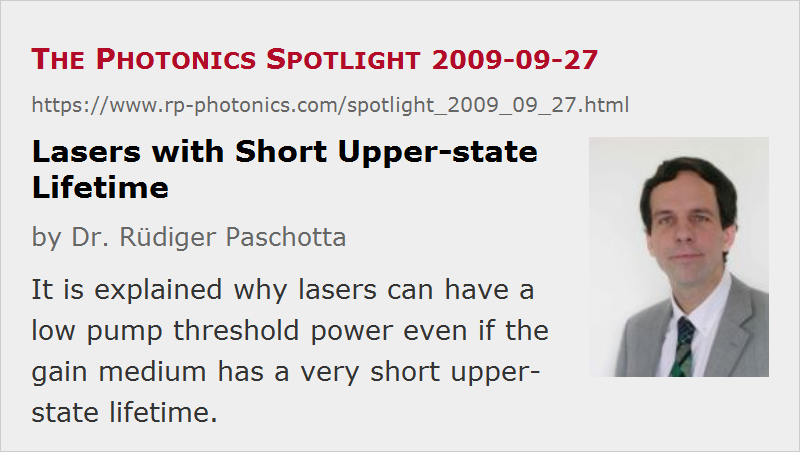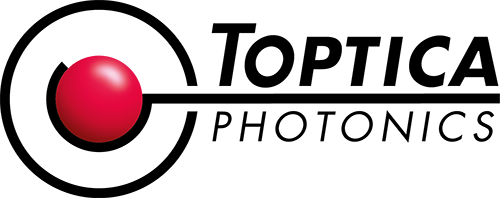Lasers with Short Upper-state Lifetime
Posted on 2009-09-27 as a part of the Photonics Spotlight (available as e-mail newsletter!)
Permanent link: https://www.rp-photonics.com/spotlight_2009_09_27.html
Author: Dr. Rüdiger Paschotta, RP Photonics Consulting GmbH
Abstract: It is explained why lasers can have a low pump threshold power even if the gain medium has a very short upper-state lifetime.

Ref.: encyclopedia article on threshold pump power; The Photonics Spotlight 2007-05-10
A reader has drawn my attention to the following observation, which surprised him. A short upper-state lifetime of a laser gain medium raises the threshold pump power. How is it then possible that some lasers – for example, semiconductor lasers – can easily reach threshold despite a very small upper-state lifetime of only a few nanoseconds?
The answer is that the threshold pump power is determined by the gain efficiency (essentially, the gain per unit pump power), and the gain efficiency is strongly related to the product of two factors: the upper-state lifetime and the emission cross section. (That product is also called the σ−τ product.) The laser threshold can be low despite a low upper-state lifetime, if the emission cross section is large. In that situation, it is not possible to obtain a high density of excited electrons (at least with continuous pumping), but each excited electron contributes a lot to the laser gain.
In principle, an extremely low laser threshold would result from the combination of a high emission cross section with a long upper-state lifetime. There are limits to that, however. Essentially, the product of emission cross section and emission bandwidth (gain bandwidth) determines the rate of spontaneous emission, and this sets a limit for the upper-state lifetime. So we see that a narrow gain bandwidth is a necessary (but of course not sufficient) condition for a high σ–τ product and thus a high gain efficiency.
Pulsed Pumping
The situation is different for pulsed pumping. When a laser is pumped with pulses, the duration of which is well below the upper-state lifetime, spontaneous emission is not very relevant for the threshold. In that case, the emission cross section rather than the σ-τ product is what counts. So the lowest threshold for pulsed pumping is obtained with a gain medium having high cross sections, and thus generally a lower upper-state lifetime.
This article is a posting of the Photonics Spotlight, authored by Dr. Rüdiger Paschotta. You may link to this page and cite it, because its location is permanent. See also the RP Photonics Encyclopedia.
Note that you can also receive the articles in the form of a newsletter or with an RSS feed.
Questions and Comments from Users
Here you can submit questions and comments. As far as they get accepted by the author, they will appear above this paragraph together with the author’s answer. The author will decide on acceptance based on certain criteria. Essentially, the issue must be of sufficiently broad interest.
Please do not enter personal data here; we would otherwise delete it soon. (See also our privacy declaration.) If you wish to receive personal feedback or consultancy from the author, please contact him e.g. via e-mail.
By submitting the information, you give your consent to the potential publication of your inputs on our website according to our rules. (If you later retract your consent, we will delete those inputs.) As your inputs are first reviewed by the author, they may be published with some delay.
 |





If you like this page, please share the link with your friends and colleagues, e.g. via social media:
These sharing buttons are implemented in a privacy-friendly way!